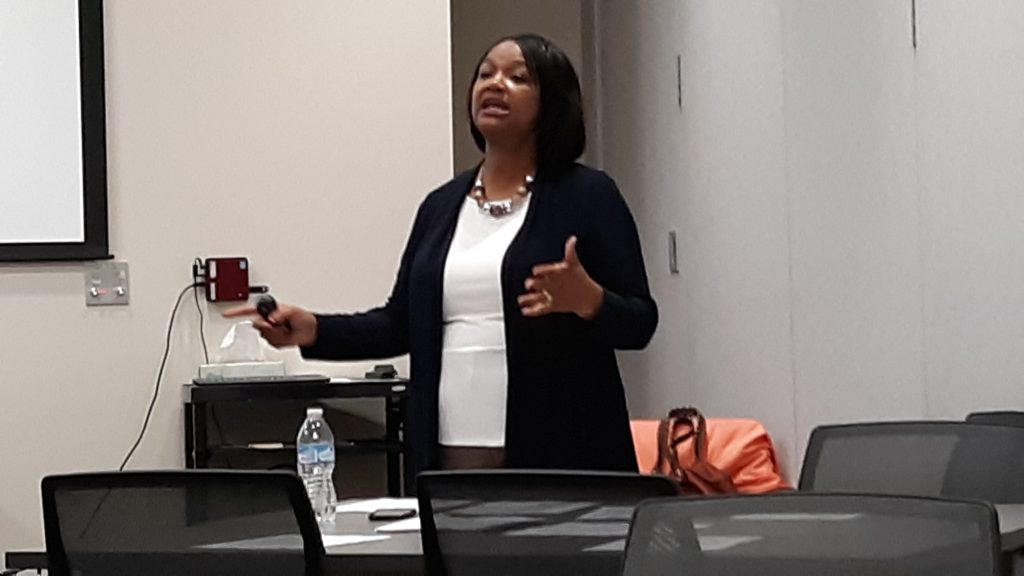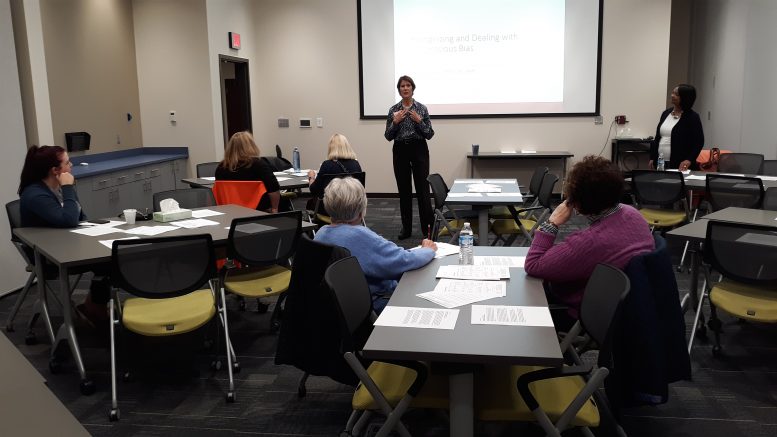By JAN LARSON McLAUGHLIN
BG Independent News
Everyone – even the nicest person – has unconscious bias.
And that bias, which might have taken root in someone as a child, may lead to snap judgments being made.
We are biased against or toward people based on countless factors, like race, socio-economic status, gender, education level, age, disability, or religion. But that doesn’t excuse how we act on those biases.
“We all have unconscious bias. Every single one of us,” Sheila Eason, a human resources consultant with Employers Association, said recently during a Not In Our Town Bowling Green “community conversation” on bias.
Unintentional bias happens automatically, Eason said. “It resides deep down in our subconscious. We’re not even aware of it. It’s a snap judgment.”
“It’s what we were taught when we were younger,” she said.
But that doesn’t mean we are absolved of responsibility for acting on that bias, Eason stressed.
Once people are aware of their own unintentional bias, it’s up to them to correct it.
For example, some people take mental shortcuts and jump to the following conclusions:
- Men are leaders, women are supporters.
- A confident female manager may be labeled as “aggressive,” while her male counterpart is described as “assertive.”
- Senior members of society are often referred to using condescending generalizations that assume dependence rather than independence.
- It is often assumed that people with disabilities are unable to participate in certain activities.
“They are often committed by people who are fair-minded,” Eason said of microaggressions. “But these type of actions chip away at people. It affects their self-worth. It’s death by a thousand nicks.”

Microaggressions are subtle but offensive comments or actions directed at someone in a minority or non-dominant group. It’s the everyday slights and indignities, that may even appear as a compliment to the person saying them, like:
- “You speak excellent English,” to someone because of the color of their skin.
- “You’re pretty for an overweight girl.”
- Complimenting an outsider for not conforming to negative stereotypes, such as “You’re not as cheap as most Jews.”
Examples of microaggressions in the workplace:
- Making the only female member of a team get coffee or take notes.
- Asking an Asian-American interviewee, “Where are you from?”
- Overlooking the contributions of marginalized team members during meetings.
- Stating or implying that female employees or employees of color were only hired as a result of affirmative action.
Examples of other microaggressions:
- Wearing Confederate flag apparel.
- Telling an African-American person that his or her name is “weird,” “unpronounceable” or otherwise unacceptable.
- Remarking that an Indian-American’s traditional lunch is “disgusting” or “strange.”
- Telling a person that he doesn’t conform to the stereotypes associated with his group, such as “You don’t seem gay.”
- Using outdated terms for racial or ethnic groups, such as colored or Oriental.
- Using identity terms in a derogatory manner, such as “That’s so gay,” or “That’s retarded.”
Eason also talked about “what’s in a name.” Apparently a lot, according to the following research done on names and racial bias:
- UCLA researchers found that people envisioned men with stereotypically black names like Jamal or DeShawn as bigger and more violent compared to men with stereotypically white names.
- Students with stereotypically “black”-sounding names tend to be labeled as troublemakers by teachers.
- Job applicants with such names are less likely than their white-sounding counterparts to get called in for interviews.
- When residents with “black”-sounding names contact their local government for information about schools or libraries, they are less likely to receive a response.
- A study at Yale revealed that the name of the applicant impacts the recruiting decision. Candidates with male names were regarded as more experienced and gifted, as well as were more likely to get hired and given a higher salary than a female candidate.
Older job applicants may also suffer from assumptions that they won’t be able to learn new software, or will be retiring soon. New moms may be frowned upon since they may be more likely to miss work or may have more children.
Millennials are sometimes pre-judged as being lazy, entitled and spending too much time on their phones. While Baby Boomers are often thought to be rigid and inflexible.
There are also biases that benefit people, Eason explained.
Humans often have “affinity bias” toward people who are like us – they went to the same school or play the same sport.
That can lead to the “halo effect,” which is when we are more likely to recognize the positive traits and actions of another person. That is the opposite of the “horn effect,” when negatives overrule all positives.
Then there is “confirmation bias,” when we look for evidence of good or bad traits to prove ourselves right.
So how can unconscious biases be counteracted?
First, Eason said, comes awareness.
“We have to be honest with ourselves about that,” she said.
Then, dissect the biases.
One white participant in the “community conversation” talked about having a crush on a black boy in junior high. She quickly learned from her dad that her feelings for the boy were not acceptable.
“I was sweet on him, and my dad had a fit,” she said. “What I was taught was wrong.”
Third, take action to change your bias. Volunteer, join an organization, or be mentored by someone.
“Stepping outside our comfort zone is good,” Eason said.
Unintentional bias may be outside our control, but showing prejudice and discriminating against someone is controllable.
“Challenge us to think about what we say and how we say it,” Eason said.
Don’t sit quietly by as someone commits a microaggression. Speak up, Eason said.
“If you change one person’s feelings, then you made a difference,” she said.

